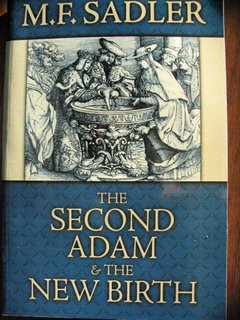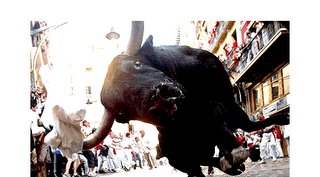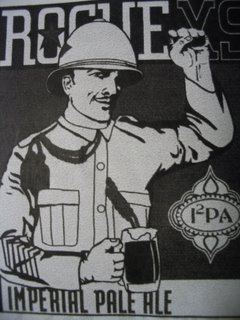Corinth was a town of rank immorality and a town of both Jews and Gentiles. The church was also a mixed bag of both Jews and Gentiles, yet this did not stop Paul from declaring, “that our fathers were all under the cloud, and all passed through the sea; and all were baptized into Moses in the cloud and in the sea. . . “. What event was Paul referring to, and why would he include the Gentiles with the language “our” when the Gentiles do not have the same fathers as the Jews? This gets at the nature of the covenant. Paul says in Romans 2.28-29, “For he is not a Jew who is one outwardly; neither is circumcision that which is outward in the flesh. But he is Jew who is one inwardly; and circumcision is that which is of the heart, by the Spirit, not by the letter, and his praise is not from men but from God.” The Apostle Paul could not make it any more clear as to who is a Jew and who isn’t. A Jew is a person who has the Law written on their heart, a person who loves the Lord and demonstrates his love for the Lord by obeying the Law.
The event in history that Paul was harkening back to was the deliverance of Israel from Egypt by passing though the Red Sea. God delivered His covenant people from bondage not because of their obedience but because of His promise to Abraham, Isaac, and Jacob. Paul uses the word “our” in reference to the fathers to signify that these men of faith are fathers to all those who believe God both Jew and Gentile. Thus they are our spiritual fathers but not necessarily our fathers by bloodline. If Paul were strictly talking about our ethnic fathers then he would be leaving out a significant portion of his congregation there at Corinth. Paul made it quite clear in First Corinthians chapter one verse two that he was talking to the entire church, “to the church of God which is at Corinth, to those who have been sanctified in Christ Jesus, saints by calling, with all who in every place call upon the name of our Lord Jesus Christ, their Lord and ours.”
These fathers, theirs and ours, were ethnically Jews and some spiritually (i.e. Moses, Aaron, Jacob, and Caleb), but not all of them. Or else why would God “lay low” so many in the wilderness? God promised Abraham in Genesis 12 and 15 that He would be his God and that Abraham would be a blessing to all the families on the earth and that his descendants would be as numerous as the stars in the heavens. God has not failed to do this. The Gentiles were brought into covenant with God as Israel transgressed from the Lord. Therefore, through Israel’s rejection of God the Gentiles were grafted into the “rich root of the olive tree” (Romans 11.17). Thus brought into covenant with God the Gentiles can lay claim to the rich heritage of the Jewish forefathers as being “our” people.
“For I do not want you to be unaware, brethren, that our fathers were all under the cloud, and all passed through the sea; and all were baptized into Moses in the cloud and in the sea” (1 Cor. 10.1-2). If all of Israel was baptized then that would mean that the men, women and children were baptized or set apart for God. Baptism is the initiatory rite of the covenant that God has made with His people. We see the initiatory rite of circumcision in Genesis 17.10-11, “And you shall be circumcised in the flesh of your foreskin; and it shall be a sign of the covenant between Me and you. And every male among you who is eight days old shall be circumcised throughout your generations, a servant who is born in the house or who is bought with money from any foreigner, who is not of your descendants. A servant who is born in your house or who is bought with your money shall surely be circumcised; thus shall My covenant be in your flesh for an everlasting covenant.” We see that circumcision was the sign of the covenant with God’s people in the Old Covenant and baptism has replaced circumcision in the New. This is seen in Colossians 2.11-12, “and in Him you were also circumcised with a circumcision made without hands, in the removal of the body of the flesh by circumcision of Christ; having been buried with Him in baptism,in which you were also raised up with Him through faith in the working of God, who raised Him from the dead.” And our union with Christ is stated in Romans 6.4, “Therefore we were buried with Him through baptism into death, that just as Christ was raised from the dead by the glory of the Father, even so we slso should walk in newness of life.”
Therefore, 1 Corinthians shows that all Israel was brought into covenant with God as they passed through the Red Sea because all passed through the sea and all were baptized into Moses. At this point I could go into the typology of Moses and how he is a type of Christ in many areas of the Older Testament yet that is reserved for a future writing. At this point Paul now directs the people to the second sign of covenant with His people by communing with them. We see this throughout the Older Testament with the Temple, Ark of the Covenant and things of this nature. Yet, here we see that God tabernacled with His people by having them partake of Himself.
First Corinthians 10.1-5 describes the events of Moses and the Red Sea, Manna in the wilderness, and water brought forth from the rock in the wilderness. He says that the fathers partook of these things. Yet, who else partook of these things? If only the males passed through the Red Sea then why does Exodus 13 describe all the Jews as passing through the Red Sea? If only the males ate and drank the spiritual food then the women and children would have perished in the wilderness. Yet, as described further in Exodus it is the next generation who enter the promised land. Therefore, we must speak as scripture speaks and say that all Israel, men women and children, passed through the Red Sea, ate the Manna in the wilderness, and drank of the Rock in the wilderness.
If we admit this, as scripture would warrant, then what does scripture say they actually did? “[A]nd all ate the same spiritual food; and all drank the same spiritual drink, for they were drinking from a spiritual rock which followed them; and the rock was Christ” 1 Corinthians 10. If this isn’t clear enough in John 6 Jesus says the He was the manna from heaven. Therefore, those men, women and children were all partaking of Christ. They communed with God, by the sacrament of communion. So you see very clearly that Paul is stating that those who ate the manna were partaking of Christ and those who were drinking the water were partaking of Christ. All those who were doing these two things had the second sign of the covenant. Jesus institutes the sacrament of communion in Matthew 26 and states that his body and blood are to be consumed by those who are in covenant with Him. We see that Judas is one of those who communions with the Lord but he spurns the grace contained within the sacrament.
So, one can see that God is calling these people to follow Him and to partake of Him covenantally. The men are called individually yet because of that calling the entire family is called into covenant with God;. The woman is not left out of the signs of the covenant because she doesn’t believe in God. She is partaking of Christ and is obligated to obey because of her union with her believing husband or father. Likewise the children are not kept from being baptized or eating of Christ till they are able to articulate a “correct theology”. They partake on the basis of their covenantal union with God through their father.
“Nevertheless with most of them God was not well pleased; for they were laid low in the wilderness.” When Paul says “laid low” he is saying that they died. God recognized their covenantal union with Him and He held them to the obligations of the covenant. He gave them signs, seals and symbols of this union, nevertheless, despite them being in covenant with Him, “with most of them” He was not pleased. God was not pleased with them so He affected justice on His people and they died as a result of their disobedience to the obligations of the covenant.
One might ask, “what was God not pleased with?” The verses in this section look back to events in Israel’s history such as the crossing of the Red Sea, manna in the wilderness, water coming from a rock, rejection of going into the Promised Land, the Golden calf, marring women who worshipped foreign gods, grumbling against God (biting of the serpents), and the rebellion of Korah. Throughout all this their prevailing attitude was a continual looking back at the time in Egypt as being the time of blessing. They viewed this as a time when all their needs were met and they had “modern” conveniences mask their slavery. They disdained God’s provision of food even while the food was in their mouths. They mocked God’s promises by claiming that Egypt was the real place of milk and honey and not the land their fathers were promised. They said this with full mouths as God had continually met all their needs and yet they grumbled, craved evil things, walked in idolatry, acted immorally, an tried the Lord.
They did not humbly accept and praise God for what they had been given. Notice too that it was the fathers who rebelled against the Lord yet the women and children were also punished. Korah and his entire family as well as everything he owned was swallowed up by the Earth.
Verses 6, 11-14
“Now these things happened as examples for us, that we should not crave evil things, as they also craved. Now these things happened to them as an example, and they were written for our instruction, upon whom the ends of the ages have come. Therefore let him who thinks he stands take heed lest he fall. No temptation has overtaken you but such as is common to man; and God is faithful, who will not allow you to be tempted beyond what you are able, but with the temptation will provide the way of escape also, that you may be able to endure it.”
Now if these items of history happened and have been written down for our instruction then what are we to learn from them? We must learn from our history so as to not incur the same consequences from the sins committed or to receive the blessings from obeying the law. After all, if I can see a man that has been stopped by the police on the same highway that I am traveling on then that is a lesson and a hint that I may need to check my speed to make sure that I am following the law.
The first lesson is clear we mustn’t crave evil things. Paul chose these items of history with a purpose and nearly all of them deal with God’s chosen people rebelling against Go’s ways. They have the attitude of, “Sure God has been good to us right now, but what about later and actually I think we were better off when we were slaves for the Egyptians. At least there we had three meals a day. I see a lot of trouble ahead therefore He has led me here and has now abandoned me.” The other attitude is one of envy for those things that God has prohibited, such as foreign wives. They are not foreign in the sense that they were of a different ethnic origin; they were foreign in the sense of a different religion. As the people of God mingled with and married foreign women of foreign gods then the people of God began to worship those gods. This is not devotion to God but devotion to convenience, with god abhors. These prohibitions that the Lord has instituted are not in place to keep one from having fun but to protect His people from actions that are destructive to His people and His name. This is not an exhaustive look at these lessons but they tested, grumbled against, were unsatisfied, discontent, untrusting, and faithless towards the very God who delivered them from the bondage of Egypt and was willing to give them the promises that He promised to their forefathers.
They became arrogant in their stance and what God had done for them. They thought they could stand; yet in the end they fell. We too must be careful how we live and see that everything that the LORD has blessed us with is by His mercy and grace and we stand (are justified) by grace through faith. It is when we become most complacent in our faith and our walk with the Lord that we are most susceptible of falling into sin and if that sin is left unrepented of then we will incur the judgment of God. This does not necessarily mean that God dos not love you, for He is love. Hebrews 12 teaches us a little about the nature of God’s love for His children.
God’s judgment can be a good thing or a bad thing depending on the recipient’s actions. Abraham, Moses, David, and Paul sinned against the Lord and did incur a certain judgment from the Lord, yet they inherited the promises of God. They are in heaven now. What did they do? They repented of their sin and lived in obedience to His word. We, in like manner, ought to do the same. If God says in Exodus 32.33 that He will blot certain people out of His book and Jesus says a similar thing in Revelation 3.5 then we must understand that those people were in the book. They had a real union with the Lord. They were the people of God, Israel. We can only understand this if we look at scripture covenantally and gain wisdom from John 15 and Romans 11. Both in some ways describe a vine or branch and a vine or branch are representative of God’s covenant people. Those branches that do not bear fruit are cut off and thrown into the fire. Now these branches had an organic, objective, real relationship with the plant/root. You would not see the branch and not realize that it was a branch for it is declared to be a branch. Yet they were cut off for not being fruitful. It is a word picture as its often used in the bile and that fruit is described in Galatians chapter 3 and that fruit comes from those who are indwelt with the Holy Spirit. So, they (the unfruitful branches) were broken off so that I might be grafted in and therefore I stand by faith. Because I, being a wild olive branch, do not deserve this blessing of being grafted into this olive tree that is God’s family, but that is exactly what has happened.
Yet knowing this we ust not fear because we have a great promise from God. “No temptation has overtaken you but such as is common to man; and God is faithful, who will not allow you to be tempted beyond what you are able, but with the temptation will provide the way of escape also, that you may be able to endure it.” Verse 13 from 1 Corinthians 10. What is this way of escape? The way of escape is Jesus Christ Himself. As we repent of our sin we will turn in the direction of our Savior and live for Him. He has redeemed us, He was the Lamb that was slain for the remission of our sins, therefore, we must live for HIm. It is the only proper response. Read the scriptures given on your own time and think upon what those temptation were that the people of God fell into in the Older Testament. They are those of 1 John 2.15-16, “Do not love the world, nor the things in the world. If anyone loves the world, the love of the father is not in him. For all that is in the world, the lust of the flesh and the lust of the eyes and the boastful pride of life, is not from the Father, but is from the world.” This is what all sin ultimately falls into; a lust of the flesh, lust of the eyes and the boastful pride of life. It is what got Eve in the Garden, it is what got these people of god in the Older TEstament and it is what gets the people of God today. Therefore, let us “pay much closer attention to what we have heard, lest we drift away from it.”
“Therefore, my beloved, flee from idolatry.” verse 14. All that Paul has been discussion about our forefathers is summarized in this verse. Our forefather’s sinful actions are there as lighthouses to guide us away from danger and that danger is idolatry. Idolatry may take many forms such as a Golden calf or something more subtle, like self-worship. When we use the time that God has given us as a time to glorify the self instead of the Father than we have put our time at a premium above time with God either through prayer, reading or the Word, or other forms of worship. We are to flee idolatry and thus by doing this we will be demonstration that we have learned from our forefathers and progressed in our understanding of God’s word.
May the Lord bless the reader and hearer of His blessed word.















